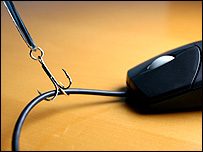-
(单词翻译:双击或拖选)

Don't get caught out by computer crime
|
Yang Li: 大家好,我是杨莉。在我们的 Real English,也就是《地道英语》节目中 我们要来学习一些书本以外的新词和说法。
Neil: English is a language that is always growing and developing. That’s why you need to keep up-to-date with Real English.
Yang Li: That’s right. Neil 那么,今天你要给大家介绍的这个新词是什么呢?
Neil: Today’s new word is 'phishing'.
Yang Li: Fishing? Isn’t that when you catch a fish from the sea or river? I don’t think that’s a new word, Neil.
Neil: I see what you mean. But this word is not connected with fish from the sea. That’s why we spell it differently. P.H.I.S.H.I.N.G.
Yang Li: 啊哈,发音相同,但是拼写不一样。So what does phishing mean, Neil?
Neil: It’s a little bit complicated so please listen carefully. Phishing describes a new kind of Internet crime.
Yang Li: A crime!
Neil: Yes, a crime using the Internet. The criminals send you an email which appears to be from your bank. The email tells you to go to a website that looks almost identical to the bank’s real website. The criminals will have all your financial details and they can start spending your money.
Yang Li: 这么说,'phishing' 可以译为 ‘网络钓鱼’, 换句话说, 犯罪人伪装成某银行网站, 并唆使你把账号或信用卡告诉他们, 从而诈骗钱财.
Insert
A: I got one of those 'phishing' emails today.
B: Phishing? What’s that?
A: Well, it’s an email that claims to be from your bank and it has a link to a website which asks for your account and credit card details.
B: So did you put your details in?
A: No way! My bank never asks for that kind of information online. It’s a trick that criminals use to steal your money.
Yang Li: I hope that the criminals don’t get into your bank account, Neil.
Neil: Well, even if they do, they won’t find much money in there, I’m afraid!
Yang Li: Same here! 好了, 我们来复习一下今天的新词. Phishing 网络钓鱼, 顾名思义, 就是以银行网站面目出现, 诈骗钱财. 所以, 万一你碰到类似的邮件,千万不要上钩儿!
Neil: Ok, Lily. We have to go now. You’ve been listening to Real English from BBC Learning English. Bye.
Yang Li: Bye.

















